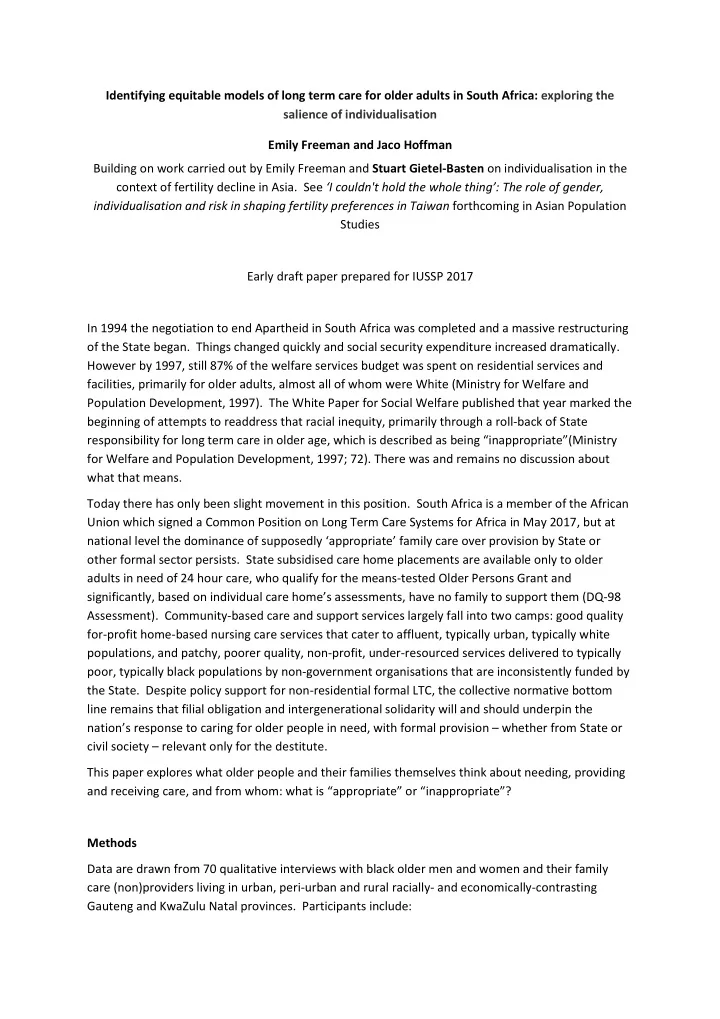

Identifying equitable models of long term care for older adults in South Africa: exploring the salience of individualisation Emily Freeman and Jaco Hoffman Building on work carried out by Emily Freeman and Stuart Gietel-Basten on individualisation in the context of fertility decline in Asia. See ‘I couldn't hold the whole thing’: The role of gender, individualisation and risk in shaping fertility preferences in Taiwan forthcoming in Asian Population Studies Early draft paper prepared for IUSSP 2017 In 1994 the negotiation to end Apartheid in South Africa was completed and a massive restructuring of the State began. Things changed quickly and social security expenditure increased dramatically. However by 1997, still 87% of the welfare services budget was spent on residential services and facilities, primarily for older adults, almost all of whom were White (Ministry for Welfare and Population Development, 1997). The White Paper for Social Welfare published that year marked the beginning of attempts to readdress that racial inequity, primarily through a roll-back of State responsibility for long term care in older age, which is described as being “inappropriate”(Ministry for Welfare and Population Development, 1997; 72). There was and remains no discussion about what that means. Today there has only been slight movement in this position. South Africa is a member of the African Union which signed a Common Position on Long Term Care Systems for Africa in May 2017, but at national level the dominance of supposedly ‘appropriate’ family care over provision by State or other formal sector persists. State subsidised care home placements are available only to older adults in need of 24 hour care, who qualify for the means-tested Older Persons Grant and significantly, based on individual care home’s assessments, have no family to support them (DQ-98 Assessment). Community-based care and support services largely fall into two camps: good quality for-profit home-based nursing care services that cater to affluent, typically urban, typically white populations, and patchy, poorer quality, non-profit, under-resourced services delivered to typically poor, typically black populations by non-government organisations that are inconsistently funded by the State. Despite policy support for non-residential formal LTC, the collective normative bottom line remains that filial obligation and intergenerational solidarity will and should underpin the nation’s response to caring for older people in need, with formal provision – whether from State or civil society – relevant only for the destitute. This paper explores what older people and their families themselves think about needing, providing and receiving care, and from whom: what is “appropriate” or “inappropriate”? Methods Data are drawn from 70 qualitative interviews with black older men and women and their family care (non)providers living in urban, peri-urban and rural racially- and economically-contrasting Gauteng and KwaZulu Natal provinces. Participants include:
Older adults receiving home-based care Older adults attending day care centres Older adults living in residential care facilities Older adults not receiving formally-provided long term care Families (not) providing long term care to older adults Interviews explored older adults’ experiences of needing, giving and receiving care and perceptions of formal and family care, and families’ experiences of and att itudes towards providing care. In addition, two focus group interviews with middle-class older adults (n=30) explored perceptions and experiences of black older adults who could potentially afford to pay for long term care. Participants were interviewed in their preferred language (Sesotho, isiZulu, Xhosa and English) by local research assistants and the first author between November and December 2016. Findings In older and younger adults ’ discussions, the ‘African family’, the large household of extended family with shared economic and social goals, still provides a strong reference point, and in many cases, prevailing practice. However the dominant discourse in both group and individual interviews is one of transition. Participants identified their realties and their preferences around care as reflective of wider social changes that were contrary to the normative pull of filial dependency. They were grounded in the specific context: entrenched poverty (>20% population (10.2 million) live below the food poverty line), extremely high unemployment (around 40%), availability of the Older Persons Grant but absence of any state safety nets for those deemed able to work, high mortality among younger adults (from HIV/AIDS, violence, road traffic accidents) but also the possibilities presented by the emerging middle class. In this paper, we want to explore just one of the foci of this transitional discourse: individualisation, or the search for a life of one’s own , and its interaction with informal (filial) and formal care. It is by no means the only story in these data – and it interacts with other foci – such as reciprocity, the importance of good family relationships and religious norms. The theory of individualisation by Ulrich Beck and Elizabeth Beck-Gernsheim is used to explain many elements associated with the Second Demographic Transition: the emergence of a multiplicity of family formation typologies (not just heterosexual married couples with children they have conceived) including reduced fertility. Put simply, it charts the process in which men and women become active agents in shaping and reshaping their own identities within both the home and the wider world, gaining freedoms and options rather than living out the lives that past institutions had designed for them. It hasn’t really been used for looking at care for older people, but we think it has real relevance for understanding some of the stories collected. Take Bongiwe, a woman in her mid-50s who cares for her now-co-resident mother-in-law. Her mother-in-law has extreme difficulty moving, is incontinent, cognitively impaired and frequently angry. Bongiwe herself had a stroke a few years ago that left her without the use of one arm making the instrumental care she is required to provide even more difficult for her. Bongiwe hasn’t always had an easy relationship with her mother-in-law but when she started to need daily care, she was the one called upon to give it, rather than her siblings-in-law:
Recommend
More recommend